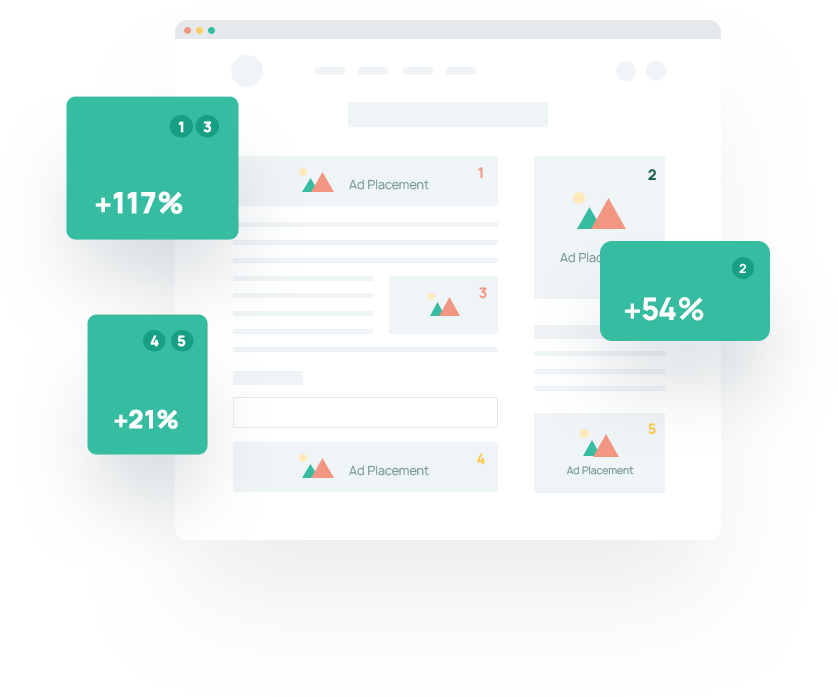
Thinking of turning off targeted ads?
With the rise of privacy laws such as GDPR and COPPA, user privacy is at the forefront of digital conversation. While some publishers handle this with ease, others find it difficult to navigate through these murky waters. Understanding the privacy laws in place and the solutions available is the key to running a successful ad-monetization strategy.
How Privacy Law Concerns Are Influencing Publishers’
As the owner of your online business, you know the importance of targeted advertisements on your website. The reason is simple: targeted ads work. They are a powerful tool to connect relevant ads to the right page visitor. The more relevant the ad, the more likely visitors will engage, thus increasing revenue generated through your website.
However, the ongoing debate surrounding targeted advertising and users’ privacy continues to grow more prevalent. Especially as revelations into the consequences of privacy violations in microtargeted ads and substandard legal protections continue to surface.
Ad networks often let you control who gets to see ads or what types of ads are shown on your site. They target users by location, language, user device, browsers, operating system, and other custom key values. For example, Google’s ad personalization targets users by the types of websites and mobile apps they visit, browser cookies, and previous interactions with advertisements; contingent, of course, on the user granting such permissions to Google or the website.
There is a clear benefit to such personalized targeting, including an anticipated increase in click-through rates. However, that’s not to say that turning off targeted ads on your website is a bad idea. While targeting ads seems like the be-all and end-all of internet advertising, there are some benefits to occasionally turning off ad targeting.
The Case For Turning Off Targeted Ads
When serving targeted ads, advertisers and ad networks need to decide on a target customer with specific demographics. Unfortunately, this is often easier said than it is done, and opportunities can fall through the cracks. Since non-targeted ads are a wide spread approach, there’s opportunity to reach customers that fall outside a brands typical target.
Similarly, visitors may come to your website who do not match the target parameters designed by advertisers. In this circumstance, serving a non-targeted ad will likely have a higher chance of yielding the desired result.
There will also be visitors to your website who prefer non-targeted ads. Some suggest that the more interest you have in a product, the less you probably care about the advertising for it. For example, if your website visitor loves Adidas, then they probably don’t need to see more advertisements for their shoes. Additionally, the visitor may prefer being introduced to new products s/he has never heard of before. In this case, serving visitors non-targeted ads could potentially increase engagement and provide an overall positive experience for visitors.
Target advertising is the way most opt to conduct ads, and there are many benefits in doing so. However, non-target advertising has some solid benefits that you should consider. By serving non-targeted ads, you are sure to cover a wide demographic of customers. As a result, you might experience a boost in click-through rates (yay, more money!). You can also capture the ‘non-targeted’ visitors and may even introduce a new and exciting service/ product to your audience.
Should I Be Concerned About Visitor Privacy Using Targeted Ads?
By now we know there are many benefits to serving targeted ads on your website. But are these benefits coming at the cost of visitors’ privacy?
With today’s advanced digital technologies, privacy concerns revolving around consumer information has never been more relevant. But before deeming targeted ads as invasive, or even immoral, let’s take a look into the good that comes out of targeted ads, and how visitors have the ability to control their personal privacy settings.
Advertising keeps many of the websites and services we use free of charge. And with targeted advertising, it’s easier than ever to serve visitors relevant and useful content. Working with a quality ad network will ensure your ads are safe, unobtrusive, and as relevant as possible. With ad networks, a lot of the responsibility to be compliant will rely on you. Unlike an ad network, a header bidding provider (more on this to come) will help your site stay compliant. They’ll ensure no violations occur, such as ads containing malware or ads that attempt to misuse visitor’s personal information.
Solutions
Consent management platform
If using a Consent Management Platform, visitors to your website can alter their ad settings to opt-out of any ad personalization. It should be noted, however, that visitors may still see ads based on factors such as general location derived from IP addresses, browser types, and search terms.
Visitors to your website can also manage companies’ cookies used for online advertising via the consumer choice tools created under self-regulation programs, such as the US-based aboutads.info choices page or the EU-based Your Online Choices.
Finally, visitors can manage cookies within their web browser as well.
Switching to a header bidding provider
Confused by the latest privacy laws? Not sure if you should serve non-targeted ads to your audience? While these are important aspects to consider, they should not impede on the time you dedicate to building your blog. For a more effortless approach, consider a header bidding partner.
Why?
Header bidding providers have the tools and expertise to keep your website compliant with privacy laws. They offer up-to-date consent management platforms and are there when you run into an issue. As if that’s not enough, they also aim to maximize ad revenue.
So what’s so great about header bidding? It’s an advanced programmatic technique that brings multiple demand sources together to bid in real-time for your ad units. It creates a fair bid auction, and the increase in competition gives publishers the highest revenue for each ad impression.
This is no new concept; most publishers have caught onto the undeniable benefit of working with header bidding providers. In fact, in 2020, 80% of publishers worked with a supply-side header bidding provider. Many publishers can earn enough to support themselves, making full-time online publishing an attainable goal for many people!
Newor Media Options
Publishers using Newor Media to manage their ads can opt-out to serve targeted ads based on user interests, demographics, and Google Account information by working with their team of ad ops professionals. In doing so, ad delivery “will not use visitation information from your site to help infer interests and demographics, and will not add visitation information from your site to users’ Google Accounts.” However, you cannot opt-out of remarketing, which shows ads to users based on their previous interactions with the advertiser.
If you’re still not sure whether or not to include non-targeted ads on your website, contact us today to be connected to an expert who can help.
